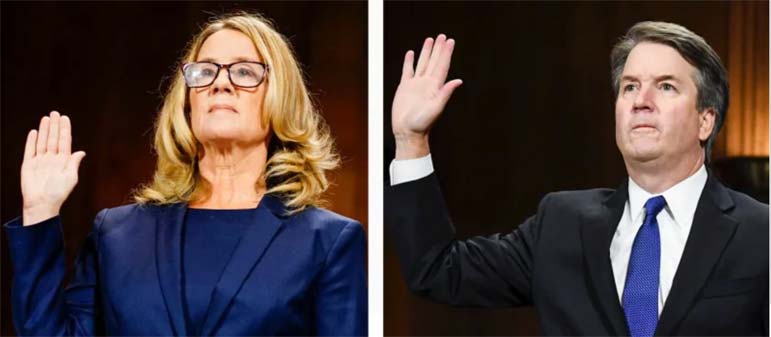 Monica Akhtar for The Washington Post
Monica Akhtar for The Washington Post
On Oct. 1, as sexual assault allegations against Kavanaugh reached their fevered height, NBC News aired an interview with his third accuser, Julie Swetnick. Her attorney, Michael Avenatti, had provided the Senate Judiciary Committee with her sworn statement alleging that when Kavanaugh was in high school, he and Swetnick had both attended parties where gang rapes occurred. Swetnick's statement had strongly implied that Kavanaugh was among the perpetrators.
But during her NBC interview, Swetnick backtracked from her allegations. Now it emerges that NBC News was aware that there might be other serious problems with her story - but waited until Thursday last week to inform the public.
In late September, NBC had contacted a woman whose anonymous sworn statement corroborating Swetnick's story had been supplied to the Judiciary Committee by Avenatti. Yet in a series of communications between Sept. 30 and Oct. 5 - the eve of the Kavanaugh vote - NBC discovered that the woman essentially failed to corroborate anything. And she repudiated Avenatti: "I do not like that he twisted my words."
Sen. Charles E. Grassley, R-Iowa, the Judiciary Committee chairman, had already referred Swetnick and Avenatti on Thursday to the Justice Department for criminal investigation for providing false statements, obstructing congressional investigation and conspiracy. After the NBC report aired, Grassley made a second referral regarding Avenatti and the veracity of the supposedly corroborating witness' sworn statement.
Again, what was NBC thinking by sitting on this story?
A network spokesman declined to comment on NBC's editorial process. But on Saturday, Kate Snow, who did the Oct. 1 interview with Swetnick, tweeted an explanation for the delay: "By the time we were able to find the woman independently from Mr. Avenatti, who declined to give us her full legal name and phone number, and fully report and vet her story, the Kavanaugh confirmation process was over and the news value was limited."
Frankly, the explanation doesn't make sense. One reason the Kavanaugh nomination exploded in partisan rancor was that his opponents, seeing what seemed like three solid sexual assault allegations, thought so much smoke suggested a pretty big fire.
For many of those critics, the fact that Kavanaugh was confirmed anyway calls the Supreme Court's legitimacy into question. Others take it as a license to pack the court next time Democrats are in power, or perhaps try to impeach him.
The fact that one of those three accusations turned out to be less than credible would have been huge news at any point in the past month. And it will remain essential to any account of the Kavanaugh confirmation for years to come.
So once more: What was NBC thinking? The conservative theory is that the network, by withholding important information, was trying to help Democrats derail Kavanaugh's nomination. But there's a less malevolent explanation, which is simply that news organizations are leery of ever questioning the credibility of a sexual-assault accusation.
That's understandable. A skeptical response to rape allegations risks re-victimizing someone who has already been brutally violated. It also makes punishing attackers more difficult, leaving them free to assault again. That's why activists are so adamant that we "believe women" and why they savage anyone who questions an accuser's reliability. Which only heightens the news media's reluctance to say "something's not right here."
When Rolling Stone magazine in 2014 published an account of a gang rape at the University of Virginia, some reporters, including me, nursed private doubts about its too-cinematic details - but, like me, they were exceedingly wary of publicly casting doubt.
Even after Richard Bradley, the editor of Worth magazine, finally raised questions about Rolling Stone's account on his personal blog, even the writers who declined to attack him for "blaming the victim" treated them gingerly. A lot more reporting was required before we were willing to state outright what we'd suspected privately - that "Jackie," the alleged victim, had made the whole thing up.
It would, of course, be much simpler if women never lied about rape. Their stories wouldn't need to be interrogated, no sifting and sorting of the facts in a crime that is notoriously hard to prosecute.
But we know that's not possible. High-profile false rape accusations such as the ones in the Rolling Stone article reflect the reality that between 2 and 10 percent of rape allegations are provably false; the FBI says 8 percent of forcible-rape allegations are "unfounded." The number of false accusations that can't be proved false necessarily pushes that number even higher. To act as if this weren't the case borders on wishful thinking, and it comes at a cost.
NBC wasn't the only media outlet that seems to have relaxed its normal standards during the Kavanaugh hearings. The New Yorker, with exceptionally weak evidence, ran allegations of his sexual misbehavior in college. The reporters no doubt believed they were making it easier for victims to be heard. But airing insufficiently vetted allegations encourages the public to distrust the media. Actual victims won't be heard if no one's listening.
(COMMENT, BELOW)
Megan McArdle is a Washington Post columnist who writes on economics, business and public policy. She is the author of "The Up Side of Down." McArdle previously wrote for Newsweek-the Daily Beast, Bloomberg View,the Atlantic and the Economist.


 Contact The Editor
Contact The Editor
 Articles By This Author
Articles By This Author